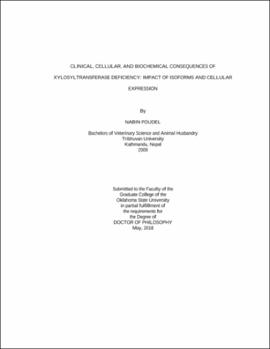| dc.contributor.advisor | Hinsdale, Myron E. | |
| dc.contributor.author | Poudel, Nabin | |
| dc.date.accessioned | 2023-04-26T16:20:25Z | |
| dc.date.available | 2023-04-26T16:20:25Z | |
| dc.date.issued | 2018-05 | |
| dc.identifier.uri | https://hdl.handle.net/11244/337471 | |
| dc.description.abstract | Proteoglycans (PGs) are components of extracellular matrix, cell membrane, and basement membrane of the cells and consist of repeating disaccharide units of amino sugar and uronic acid, also known as glycosaminoglycans (GAGs) covalently linked to a PG core protein serine via a linker tetrasaccharide structure. The assembly of GAGs begins with the assembly of a xylose onto designated serine residues of the core protein by xylosyltransferase (XylT). There are two distinct isoforms of XylT: Xylt1 and Xylt2. Xylt2 is ubiquitously present while Xylt1 is limited to some organs. PGs and their GAG chains are very diverse in nature due to the variation in GAG length as well as due to post polymerization modifications including epimerization, deacetylation, and sulfation. This diversity makes PGs highly versatile molecules that can regulate multiple signaling pathways during growth, differentiation, proliferation and pathophysiology. Here in this study, using two distinct Xylt isoform knockout mice models in addition to human patients with mutations in XYLT2, we gain understanding of the roles of PGs during development, renal and pulmonary homeostasis and pathophysiology. We show that Spondyloocular syndrome, a rare congenital genetic disorder affecting musculoskeletal system, sensorineural system and cardiovascular syndrome, is caused by mutations in XYLT2. Using isoform-specific knockout mouse models, we show that XylT2 is critical in maintaining renal nephron physiology where reduced PG glycosylation in XylT2 deficiency results in proteinuria due to glomerular and tubular dysfunction mimicking many chronic kidney disease phenotypes. We also show that, despite XylT1 being the minor isoform in the lungs, XylT1 deficiency causes reduced pulmonary function and increased susceptibility to endotoxin-induced acute lung injury possibly due to reduced PG core protein expression, altered surfactant biology, and hyper-activation of NFkB signaling pathway. | |
| dc.format | application/pdf | |
| dc.language | en_US | |
| dc.rights | Copyright is held by the author who has granted the Oklahoma State University Library the non-exclusive right to share this material in its institutional repository. Contact Digital Library Services at lib-dls@okstate.edu or 405-744-9161 for the permission policy on the use, reproduction or distribution of this material. | |
| dc.title | Clinical, cellular, and biochemical consequences of xylosyltransferase deficiency: Impact of isoforms and cellular expression | |
| dc.contributor.committeeMember | Liu, Lin | |
| dc.contributor.committeeMember | Oomens, Antonio G. | |
| dc.contributor.committeeMember | Hartson, Steven | |
| osu.filename | Poudel_okstate_0664D_15638.pdf | |
| osu.accesstype | Open Access | |
| dc.type.genre | Dissertation | |
| dc.type.material | Text | |
| dc.subject.keywords | extracellular matrix | |
| dc.subject.keywords | proteinuria | |
| dc.subject.keywords | proteoglycans | |
| dc.subject.keywords | pulmonary homestasis | |
| dc.subject.keywords | spondyloocular syndrome | |
| dc.subject.keywords | xylosyltransferase | |
| thesis.degree.discipline | Veterinary Biomedical Sciences | |
| thesis.degree.grantor | Oklahoma State University | |
